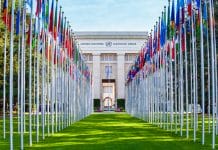By Dr Alvin Ng Lai Oon,
World Mental Health Day was held on Oct 10. This year’s theme is: “Mental Health for All – Greater Investment – Greater Access. Everyone, Everywhere”. It is a very apt theme as we’re now being challenged by the Covid-19 pandemic, compounding all kinds of existing difficulties that we’re facing.
Even before the pandemic, mental health problems have been increasing globally, despite the improvement in treatment methods and technology. As such, there was a need for greater investment in mental health and improved access to treatment. Given the pandemic, this need is even more dire.
Mental health issues are growing with the number of Covid-19 infections. Anxiety and depression from the sense of helplessness have become more common in the community, especially when economic activities are significantly affected. Demands for mental health professionals are increasing exponentially worldwide.
Mental health problems are an added disability to discharged Covid-19 patients experience more than just physical disabilities such as fatigue and reduced breathing efficacy. Research have shown that at least half of individuals recovering from the virus develop some form of mental illness such as obsessive-compulsive disorder (OCD), posttraumatic stress disorder (PTSD), major depression and generalised anxiety disorders.
These conditions increase the burden of disease that is already severely impacted by the deadly virus. The burden of disease impacts all layers of society, from individuals and families, to the larger community and front-liners who face high risk of infections daily.
With a second wave of infections in Malaysia, it is expected that stress and anxieties surrounding the daily reports of cases and death will be at an all-time high. Mental health and psychosocial support services that have been very active in providing 24-hour help to both the general public and front liners are themselves already on the verge of burnout. There is only so much any government can invest. Malaysia is already doing its best given the dearth of mental health professionals in the country.
Countries such as the USA and Australia have many more mental health professionals than Malaysia, and national health insurance that also covers mental health access services. Recently, the country has increased its budget to cover for psychological treatment, by doubling the number of Medicare-funded psychology sessions for the public in light of increasing mental health problems related to the pandemic. However, with demands for help skyrocketing, funding can do little if human resources are scarce.
Given the limited resource for better access to mental health help, there is a need for all of us to heed this year’s WMHD theme – by investing ourselves – our time and effort to improve access of mental health and psychosocial support to everyone, everywhere. Mental illness is everyone’s problem because we are all connected. Especially in the current threat of Covid-19, we are either affected ourselves, or live or work with people who are afflicted. So, it is our collective responsibility to do something about it.
How can we do this? By improving our mental health literacy. It is about improving our knowledge of what mental health and mental illness are, as well as the factors affecting them. Mental illness has a face. It looks just like you and me. You don’t have to look like the typical image associated with a psychiatric illness to have a problem. If you do, then your problem likely to be severe. So, it is very helpful to check in on your family members, friends and colleagues to see if they’re OK.
Mental health literacy also involves knowing where, who and how to seek help for mental health issues. Learn to manage your own mental health. Get skilled in managing stress, problem-solving and to identifying sources of support. Provide mechanisms in place to maintaining recovery by engaging in daily activities that improves independent functioning such as regular physical activity and other self-care initiatives. Learn to also provide psychosocial help to others.
It is important to recognise that mental illness can be treated, and be empowered to seek help or to help others seek help for mental health issues. This is a positive attitude that comes from having adequate mental health literacy. It serves all levels of community, workplaces and organisations.
Community leaders skilled in psychosocial help, and organisations provide mental health resources such as employee assistance programme can reinforce positive attitudes towards mental health. Being from a higher education institution within a corporation that values mental health and actively promotes it, I can attest the confidence it gives to its employees to seek help where needed. Flyers and notices that provide information for mental health resources can make a difference.
Active efforts to promote mental health management is something we can ALL do. There’s no need just depend on mental health professionals or organisations. Prevention begins with us. Let’s get savvy about mental health and share with others. We all could do with the help and support.
About the Author
Dr Alvin Ng Lai Oon is Professor and Head at the Department of Psychology, School of Science and Technology, Sunway University. Trained as a clinical psychologist, he is very passionate about promoting mental health literacy in the community as a way to address the needs for improved access to psychosocial help.









